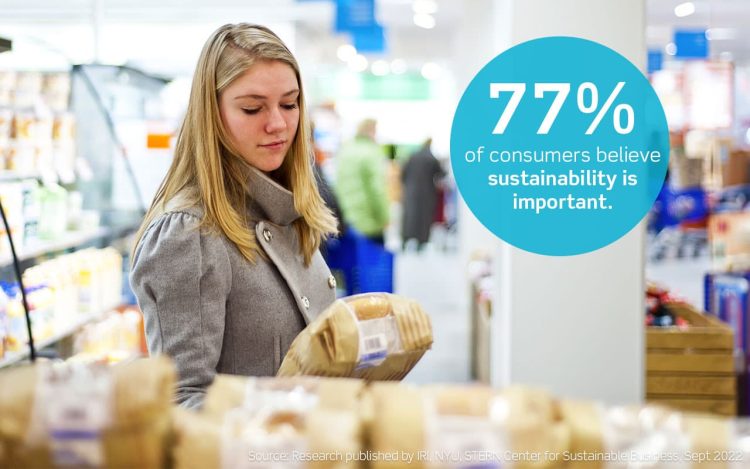Much has changed since the days when “sustainability” was little more than a buzzword to most. Over the past 20-30 years, businesses have gradually begun to grasp the true value and relevance of sustainability as a driver of business performance, no longer viewing it simply as a necessary part of corporate image management. Today, nearly all of the world’s largest companies set sustainability goals and publish their progress toward them, and more than 2,000 companies have established science-based carbon reduction targets.1
This doesn’t mean, however, that these same companies have thoroughly and effectively identified and pursued important opportunities to cut emissions, reduce resource and material waste, lower energy costs, minimize logistics expenses and enhance their reputation as a future-focused organization. That process takes time and teamwork … and a lot of it. In fact, if done correctly, sustainability becomes an essential aspect of everyday business management and a component of virtually every strategic business decision.
Relevance in the Market
Although discovering where the greatest opportunities for efficiency gains exist might take a while, the consumer demand drivers in favor of more sustainable practices are already becoming quite clear.
Today’s consumers, particularly Millennials and Gen Z-ers, want the foods they buy to be good for them and good for their fellow humans and the planet. Increasingly, the notion of sustainability determines a food’s worth for many, thanks to growing concerns about climate change, resource scarcity and potential health effects associated with certain products, including baked goods. Nearly 62% of Millennials, for instance, say they consider environmental friendliness to be very important to sustainability in bakery products.2
Here is a glimpse of what we know about the ways consumers are connecting sustainability principles with the purchasing decisions they make:
- 77% of consumers believe sustainability is important. 3
- Sustainability-marketed products are driving 1/3 of all CPG growth. 3
- Sustainability-marketed products are growing nearly 3x faster than conventionally marketed products. 3
- In 2021, 50% of all new products were sustainability-marketed. 3
- Millennials are the go-to-market segment for sustainability-marketed bakery products. 3
- Reducing by-products, reducing waste and extending shelf life are among the most important sustainability messages for baked goods. 3
- Sustainability-marketed bakery products command a 38% premium…cookies 116%.4
- Online shoppers are looking for your sustainability messaging. 3
- Carbon labeling and communicating efforts on reducing waste are two great ways to appeal to the bakery consumer’s desire to align with more sustainable brands.
Understand Where the Opportunities are
When looking for areas of opportunity for sustainability gains, there are themes common to most businesses and even industries in varying degrees. Sourcing materials and supplies responsibly uses your purchasing power to influence the use of sustainable practices beyond the borders of your business; insisting that your suppliers do their part allows you to have a greater impact on your overall value chain. For bakers, that includes purchasing RSPO-certified palm oil and Bonsucro-certified sugar, for example.
Increasing energy efficiency to lower consumption and costs requires thoughtful analysis and decision-making, but it can make a significant impact. Conducting an energy audit to identify areas of energy waste and opportunities for improving efficiency is a great place to begin. Typically, there are numerous alternatives to consider, such as purchasing more energy-efficient equipment, optimizing baking processes, implementing maintenance plans, incorporating renewable energy, insulating buildings and equipment, and using more natural light.
Considering changes in product packaging can deliver sustainable benefits, too. Design changes can reduce the amount of packaging material used, and even the amount of space needed for product storage. Using recyclable or biodegradable materials helps reduce environmental impact, and educating consumers about proper recycling or disposal habits contributes to maximizing that impact.
The Greatest of Them all
Waste not, want not.
The universally known adage may be an obvious component of what it means to operate a business sustainably, but a closer look reveals that the significance of reducing food waste during production and after is bigger than many truly comprehend.
Think about it: When a baker wastes less material in production – whether due to poor training, equipment malfunctions, overly gummy dough or some other quality issue – the business bears all costs incurred up to that point in the supply chain. That includes raw materials; the fuel and emissions required to transport those raw materials; the energy, water, and other inputs required to produce and process those raw materials; and the energy and labor put into combining those materials to create the dough. All of these environmental impacts and financial costs are incurred … without a sale on the other side.
Food waste due to shelf-life limitations or other damage to finished products, logically, creates even more of the same kinds of negative impacts, both fiscal and environmental. Implementing effective solutions for extending product shelf life helps give bakers their best shot at ensuring that upstream costs and emissions are not for naught. Preservation is, therefore, the area of opportunity that encompasses nearly all facets of what it means to operate sustainably.
Corbion’s stated purpose is to “preserve what matters.” There are, of course, many, many things that matter, and among them are your business, the consumers who benefit from your products, our friends and families, and the health of the planet it all depends on. Our experts in baking, preservation and sustainability are here to help you create the sustainable business you envision.
Sources:
1 Harvard Business Review, “Sustainable Business Went Mainstream in 2021,” Jan 6, 2022
2 Corbion Proprietary Consumer Research, Pulse Survey, Q1, 2023, US Consumers of Bakery/Bread Products, n592
3 Research published by IRI, NYU, STERN Center for Sustainable Business, Sept 2022
4 IRI POS data for MULO across 38 core categories. Analysis by NYU, STERN Center for Sustainable Business


